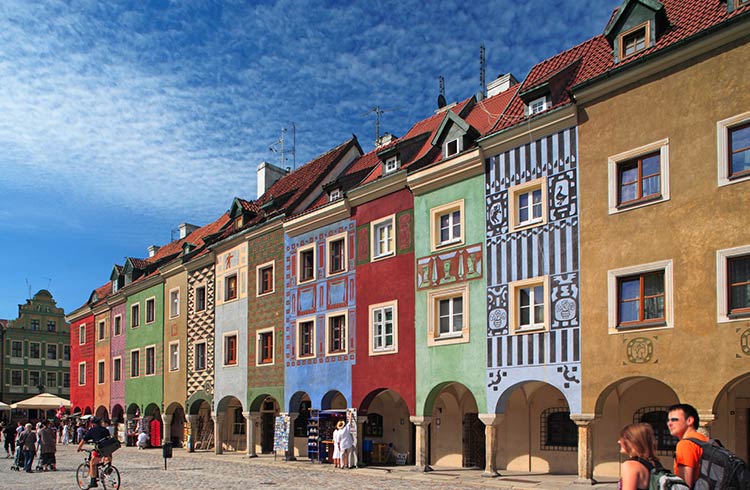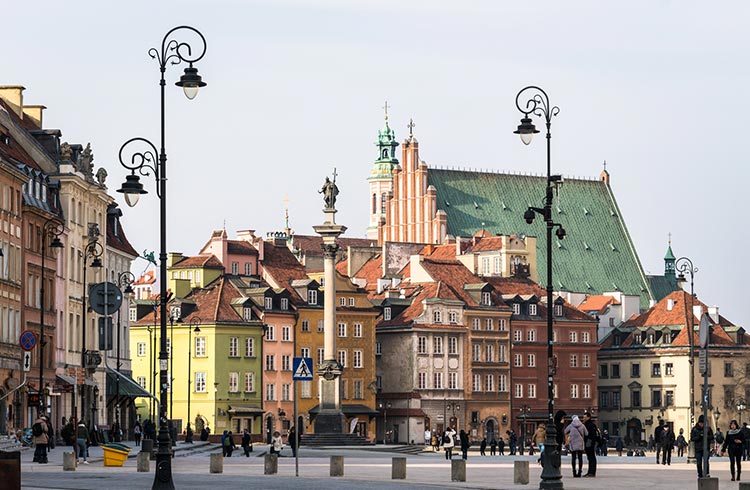4 Important Things to Know Before You Go to Poland
Poland has a few necessary entry requirements and local laws to be aware of. Here's everything you need to know before you go.
 Photo © Getty Images/Guy Vanderelst
Photo © Getty Images/Guy Vanderelst
Call it a hangover from the days when the iron curtain fell across Europe, but many people still think of Poland as a dark, soviet-style place. However, Poland has come a long way since 1989 and the fall of the Soviet states, and while Poland is a modern nation and a member of the EU, there are still a few remnants of the "old ways" to catch unwary travelers.
Here are a few things you need to know before you go and while you're there.
- Visas and Entry Requirements for Poland
- Tips for Artists or Taking Polish Art Out of the Country
- What to Do When You Arrive in Poland
- It's Illegal to Drink Alcohol in Public
- Listen to The World Nomads Podcast: Poland
1. Visas and Entry Requirements for Poland
Poland is a European Union member and a party to the Schengen Convention. If you're from the US, Canada or Australia, you can enter Poland without a visa and stay for up to 90 days. If you're from a country in the EU, you do not need visa. To be sure, check this list of countries who do not require a visa before entering Poland.
Make sure your passport has minimum six months validity, otherwise you'll be turned away at the border. Always travel with sufficient funds to keep you traveling and pay for your return plane ticket.
It's also compulsory to carry proof of medical insurance to cover the cost of any emergency treatment or hospitalisation in Poland.
If you're traveling around within the EU you can bring in as much alcohol and tobacco as you can carry, as long as it's for personal use. It gets difficult if you're bringing those things in from outside the EU, and customs officers are sticklers for the rules.
You'll have similar problems if you're carrying the equivalent (in any currency) of 10,000 Euros in cash (or a traveler's check, which are only accepted by the main banks and hotels if you are still using them). If you're lucky enough to be traveling with this kind of cash, make sure you declare it on the way in, or it won't be leaving with you. This rule is also applicable across all European countries.
If traveling from outside the EU and arriving in Poland as your first European stop, make sure you get your passport stamped. Otherwise customs officials in other EU countries will be wondering how you got into Europe.
2. Taking Polish Art Out of Poland
Polish art and artists are not well known outside Poland, but there's a rich tradition that the authorities guard jealously.
You'll need permits to take out artworks created before 1955. Art created after 1955 could still be banned from export, especially if the artist has died. Best to check with the Provincial Conservator of Relics about any piece you take a fancy to.
If you're bringing in artwork, even for an exhibition, declare it, because they might hang on to that too.
3. What to Do When You Arrive in Poland
In all major cities in Poland – Warsaw, Krakow, Gdansk, Wroclaw – there are designated taxi stands at the airports. Use them and avoid the "taxi drivers" who approach you outside the terminal, you'll end up paying significantly more for your trip into the city. Official taxi drivers will always run a meter in their vehicles. Always carry small notes on you, especially handy if you accidently end up in a dodgy taxi and the driver is keen on charging you a premium so you can give them the correct fare. Handing over larger notes gives them more of an opportunity to short change you.
There are plenty of airport to city bus services, but many of them attract pickpockets and other thieves trying to take advantage of tired or distracted travelers. The number 175 bus from Warsaw airport to the city is notorious for pickpockets, so keep your belongings close by and be wary of others around you.
Bus services in Gdansk are less of a problem.
Before entering a bus, you should buy a ticket. Bus tickets can be purchased at most newspaper stands, at the airport or from the bus drivers. If you buy a ticket from the driver, you pay a bit more. Tickets must be then validated at the start of the journey on board. Tickets for intercity bus companies can be bought online, so make sure you book ahead.
All foreigners are required to register their place of residence within 48 hours. It's normally done as part of the check-in procedure at hotels, but if you're staying in a private residence you're still obliged to register. Your hosts will know where you have to go to sign the forms.
4. Drinking Alcohol in Poland
Don't be fooled into thinking Polish drinking culture extends to the streets. It's actually illegal to drink in public – so keep your drinking indoors and within bars or restaurants. Drinking an alcoholic beverage – whether it's a cheap beer or botle of wine – in a park or while walking to the pub will earn you a fine from the police, and you'll have to pay on the spot.
Actually, if you're walking home drunk from the pub, try your best to keep yourself upright. Drunkeness isn't taken lightly by Polish police, so don't act foolish in public and keep a low profile if you've one or six too many drinks.
Listen to The World Nomads Podcast: Poland
Related articles
Simple and flexible travel insurance
You can buy at home or while traveling, and claim online from anywhere in the world. With 150+ adventure activities covered and 24/7 emergency assistance.
Get a quote


No Comments